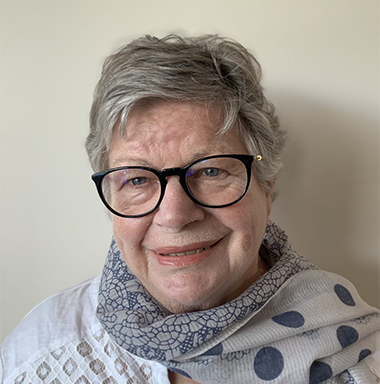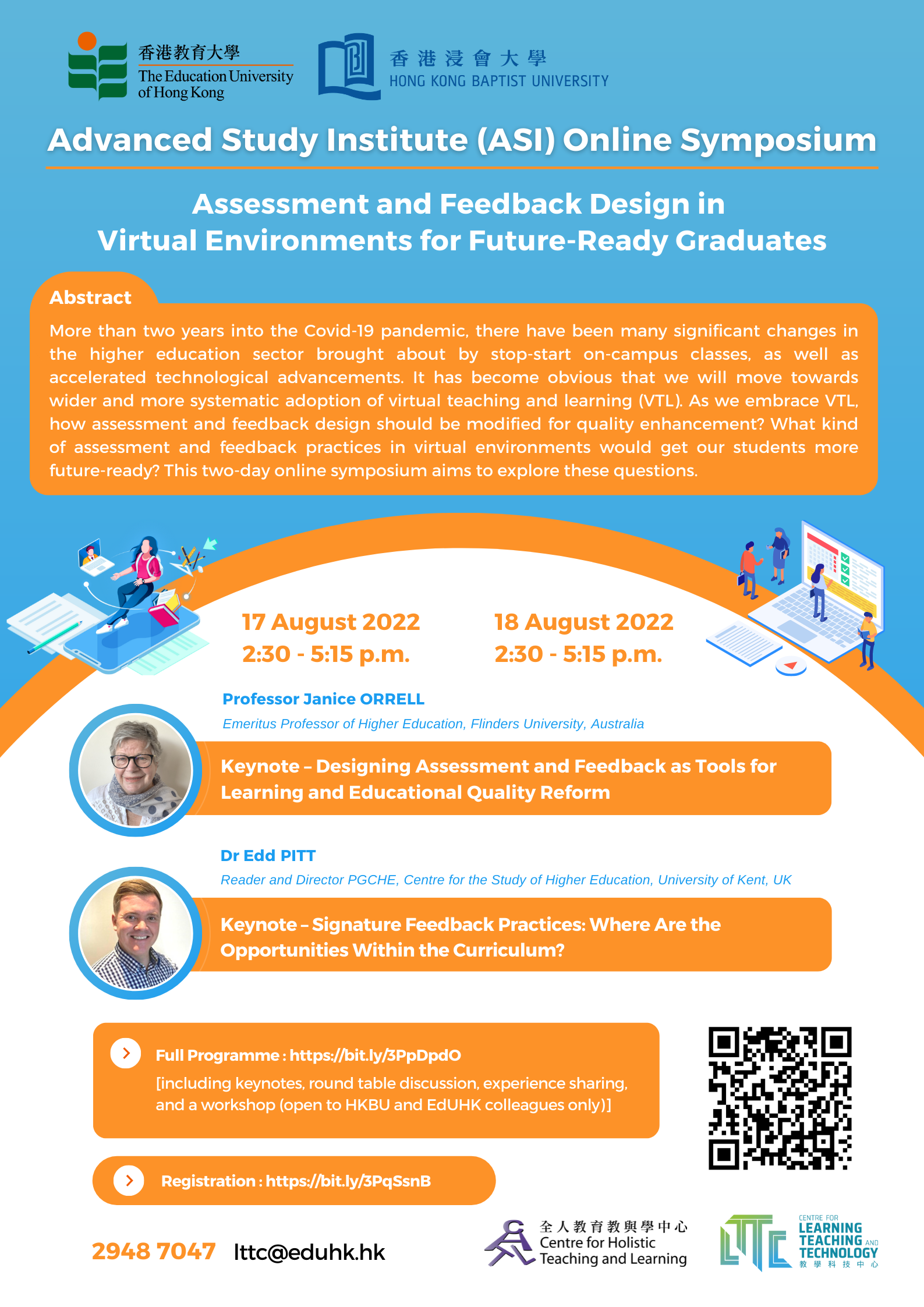Advanced Study Institute (ASI) Online Symposium
Topic: Assessment and Feedback Design in Virtual Environments for Future-ReadyGraduates Date & Time: Wednesday, 17 August 2022 2:30 - 5:00p.m.&
Thursday, 18 August 2022 2:30-5:15p.m.
Venue: Online through ZOOM
Abstract:
More than two years into the Covid-19 pandemic, there have been many significant changes in the higher education sector brought about by stop-start on-campus classes, as well as accelerated technological advancements. It has become obvious that we will move towards wider and more systematic adoption of virtual teaching and learning (VTL). As we embrace VTL, how assessment and feedback design should be modified for quality enhancement? What kind of assessment and feedback practices in virtual environments would get our students more future-ready? This two-day online symposium aims to explore these questions.
Rundown
(Note: Time periods below are based on Hong Kong Time Zone)17 August 2022 (Open to All)
| Welcome & Greetings | |
|---|---|
| 2:30pm – 2:35pm | Dr Albert CHAU Vice-President (Teaching and Learning), HKBU |
| 2:35pm – 2:40pm | Professor John LEE Chi-kin Vice President (Academic) and Provost Vice-President, EdUHK |
| Keynotes | |
| 2:40pm – 3:10pm |
Keynote I: Designing Assessment and Feedback as Tools for Learning and Educational Quality Reform Emeritus Professor Janice ORRELL, Flinders University, Australia |
| 3:10pm – 3:20pm | Q&A |
| 3:20pm – 4:00pm |
Keynote II: Signature Feedback Practices: Where are the Opportunities within the Curriculum? Dr Edd PITT, University of Kent, UK |
| 4:00pm – 4:10pm | Q&A |
| 4:10pm - 4:20pm | Break |
| Round Table Discussion | |
| 11:15am –12:05pm |
Student Voice in Feedback Panelists: • Dr Albert CHAU, Vice-President (Teaching & Learning), HKBU • Dr Sammy, King Fai HUI, Associate Vice President (Student Learning), EdUHK • Ms Clarise, Ka Hei HO, BA (Lang Studies) & BEd(EL) Year 3 Undergraduate, EdUHK • Ms Heidi LO, Graduate of BEd (EL), EdUHK • Ms Yoyo, Lewei HE, Department of Finance and Decision Sciences, Undergraduate, HKBU • Ms Kelly, Hei Ching TSOI, Department of Sport, Physical Education and Health, Undergraduate, HKBU |
| Housekeeping Announcement | |
| 5:10pm - 5:15pm | Housekeeping Announcement |
18 August 2022
| Welcome & Greetings | |
|---|---|
| 2:30pm – 2:35pm | Professor S C KONG Director, Centre for Learning, Teaching and Technology, EdUHK |
| Experience Sharing | |
| 2:35pm – 4:00pm |
Assessment with Real-World Relevance Speakers from EdUHK Dr Bill YEUNG, Associate Professor, Associate Head (Research and Postgraduate Studies) of Department of Science and Environmental Studies Mr Roy CHAN, Senior Lecturer, Department of Health and Physical Education Speakers from HKBU Dr Archimedes David GUERRA, Lecturer, Department of Finance and Decision Sciences, HKBU Ms Assunta NG, Lecturer, Department of Sport, Physical Education and Health, HKBU |
| 4:00pm – 4:10pm | Break |
| Workshop (open to HKBU and EdUHK colleagues only) | |
| 4:10pm – 5:10pm |
Workshop – Signature Feedback Practices: Leveraging time to maximise the impact of classroom based feedback opportunities Dr Edd PITT University of Kent, UK |
| Closing | |
| 5:10pm – 5:15pm | Dr Theresa KWONG Director, Centre for Holistic Teaching and Learning, HKBU Housekeeping Announcement |
Keynote Speakers
Keynote 1: Emeritus Professor Janice ORRELL
Title: Designing Assessment and Feedback as Tools for Learning and Educational Quality Reform
Abstract
The question to be addressed in this presentation is:
How can assessment and feedback design enhance student learning quality and ensure their readiness for future engagement in society and employment?
This is an essential pedagogical question and should be a central interest of all education. Assessment design and its practices, including feedback, occupies considerable effort and time resources of both students and teachers and poses a high risk for some, however, it all too often is a postscript, an afterthought, in the educational process, becoming something to be done when the learning is over.
The question posed infers that assessment design and the information that the products of students’ assessment performances can have long term value in shaping students’ capabilities for when they graduate. Designed well, it is possible for assessment and feedback processes to capture students’ imagination and engagement, such that they can become self- regulating agents of their own learning for the longer term. However, if this deep engagement is to occur, assessment design must become an integral element of curriculum design and not become a postscript to both the teaching and the learning It also needs to be an organisational shift, not one that is left to the personal inclination of individual teachers. This requires a cultural shift in the way we conceive assessment within the curriculum to one that perceives assessment as and for learning not always assessment of learning, namely, to generate grades.
In this presentation I will draw distinctions between these two competing functions of assessment and focus on the ways to gain greater engagement of students in the educational process through task design and the use of feedback and provide examples of successful ways that such shifts to assessment as and for learning have occurred.
Biography
Emeritus Professor Janice ORRELL
Emeritus Professor Janice Orrell at Flinders University is focusing on Work Integrated Learning (WIL), assessment in higher education. She is a co-author of the book Work Integrated Learning: A Guide to Effective Practice (2010), and the author of the WIL Good Practice Guide (2011). She is an advisory consultant/evaluator for national higher education projects and an Academic Board member in Higher Education institutions. In 2021 she received the USA Cooperative Education and Internship Association (CEIA) James W Wilson award for outstanding contribution to research, and in 2022 she received a HERDSA Leadership Award for her leadership in higher education research and development.
Keynote 2: Dr Edd PITT
Title: Signature Feedback Practices: Where are the Opportunities within the Curriculum?
Abstract
It’s long established that feedback can be extremely beneficial for students’ learning; however, barriers to its active use by students are consistently reported. Once approach to address this is for educators to design in opportunities for its uptake within their curricula. In this keynote I will specifically draw upon two areas of research that have sought to operationalise a learning focused feedback design to improve student learning.
In the first part of the keynote, I will outline the current feedback research directions which question our collective understanding of what constitutes feedback. I will draw upon examples from around the world which identify how improvements can be made and opportunities seized upon. In the second part of the keynote I will draw upon Quinlan and Pitt’s (2021) recent taxonomy of signature feedback practices. In this taxonomy four main sources of feedback information; knowledge or audiences, disciplinary colleagues, the self and objects are suggested as the building blocks of a disciplines signature feedback practice. I will discuss how the curriculum within a discipline can be leveraged to create opportunities for both educators and peers to offer evaluative feedback (characterised as judgments, criticisms, and suggestions for enhancement) and consequential feedback (information about the effect of the learner’s performance or action). I will give specific examples of how this taxonomy can exist within arts and humanities curricula (Pitt and Carless, 2021) to afford students multiple and sustained opportunities to seek, generate, process and enact both evaluative and consequential feedback.
Biography
Dr Edd PITT
Edd is a Reader in Higher Education and Academic Practice and the Programme Director for the Post Graduate Certificate in Higher Education in the centre for the study of higher education at the University of Kent, UK.
Edd has recently been collaborating with Academics in the UK, Ireland and Australia. His principal research field is Assessment and Feedback with a particular focus upon student's use of feedback. His current research agenda explores signature feedback practices and the development of both teacher and student feedback literacy.





